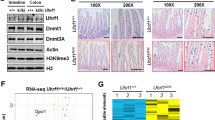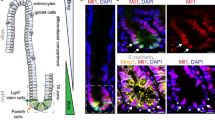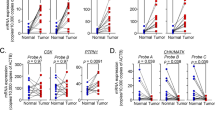Abstract
Colorectal cancer is a major cause of cancer death worldwide. A number of key oncogenes and tumor suppressor genes have been proposed to drive progression from healthy colonic epithelia to malignant tumors, including members of the Wnt/β-catenin pathway. Recently, CpG island promoter hypermethylation was shown to cause inactivation of two extracellular Wnt inhibitors in colon cancer: secreted frizzled-related proteins (sFRPs) and Wnt inhibitory factor-1 (WIF-1). Here, we show for the first time that another extracellular Wnt inhibitor, the DICKKOPF-1 (DKK-1) gene, is transcriptionally silenced by CpG island promoter hypermethylation in colon cancer cell lines (n=9), whereas treatment with the DNA-demethylating agent 5-aza-2-deoxycytidine restored DKK-1 expression. Restoration of DKK-1 function in non-expressing cells bearing a truncated APC (Adenomatous Polyposis Coli) gene had no effect on β-catenin/T-cell factor-dependent transcription, but induced tumor suppressor-like features such as reduced colony formation density and tumor growth inhibition in nude mice. These results suggest additional functions for DKK-1 other than inhibiting canonical Wnt signaling. In primary colorectal tumors, DKK-1 was found hypermethylated in 17% (nine of 54) of cases. Furthermore, while for both SFRP-1 and WIF-1 methylation-associated silencing occurred across the whole spectrum of colorectal tumorigenesis, DKK-1 promoter was selectively hypermethylated in advanced colorectal neoplasms (Duke's C and D tumors).
This is a preview of subscription content, access via your institution
Access options
Subscribe to this journal
Receive 50 print issues and online access
$259.00 per year
only $5.18 per issue
Buy this article
- Purchase on Springer Link
- Instant access to full article PDF
Prices may be subject to local taxes which are calculated during checkout



Similar content being viewed by others
References
Alaminos M, Dávalos V, Ropero S, Setién F, Paz MF, Herranz M et al. (2005). Cancer Res 65: 2565–2571.
Bafico A, Liu G, Goldin L, Harris V, Aaronson SA . (2004). Cancer Cell 6: 497–506.
Bafico A, Liu G, Yaniv A, Gazit A, Aaronson SA . (2001). Nat Cell Biol 3: 683–686.
Ballestar E, Esteller M . (2002). Carcinogenesis 23: 1103–1119.
Ballestar E, Paz MF, Valle L, Wei S, Fraga MF, Espada J et al. (2003). EMBO J 22: 6335–6345.
Chamorro MN, Schwartz DR, Vonica A, Brivanlou AH, Cho KR, Varmus HE . (2005). EMBO J 24: 73–84.
Fearon ER, Vogelstein B . (1990). Cell 61: 759–767.
Fraga MF, Ballestar E, Villar-Garea A, Boix-Chornet M, Espada J, Schotta G et al. (2005). Nat Genet 37: 391–400.
Fraga MF, Herranz M, Espada J, Ballestar E, Paz MF, Ropero S et al. (2004). Cancer Res 64: 5527–5534.
Gloeckler Ries LA, Reichman ME, Lewis DR, Hankey BF, Edwards BK . (2003). Oncologist 8: 541–552.
González-Sancho JM, Aguilera O, García JM, Pendás-Franco N, Peña C, Cal S et al. (2005). Oncogene 24: 1098–1103.
González-Sancho JM, Brennan KR, Castelo-Soccio LA, Brown AMC . (2004). Mol Cell Biol 24: 4757–4768.
He B, Reguart N, You L, Mazieres J, Xu Z, Lee AY et al. (2005). Oncogene 24: 3054–3058.
Kawano Y, Kypta R . (2003). J Cell Sci 116: 2627–2634.
Kinzler KW, Vogelstein B . (1996). Cell 87: 159–170.
Kuhnert F, Davis CR, Wang HT, Chu P, Lee M, Yuan J et al. (2004). Proc Natl Acad Sci USA 101: 266–271.
Lee AY, He B, You L, Xu Z, Mazieres J, Reguart N et al. (2004). Biochem Biophys Res Commun 323: 1246–1250.
Maeda K, Kawakami K, Ishida Y, Ishiguro K, Omura K, Watanabe G . (2003). Oncol Rep 10: 935–938.
Mao B, Wu W, Davidson G, Marhold J, Li M, Mechler BM et al. (2002). Nature 417: 664–667.
Mao B, Wu W, Li Y, Hoppe D, Stannek P, Glinka A et al. (2001). Nature 411: 321–325.
Mazieres J, He B, You L, Xu Z, Lee AY, Mikami I et al. (2004). Cancer Res 64: 4717–4720.
Mikheev AM, Mikheeva SA, Liu B, Cohen P, Zarbl H . (2004). Carcinogenesis 25: 47–59.
Miller JR . (2002). Genome Biol 3: 1–15.
Niida A, Hiroko T, Kasai M, Furukawa Y, Nakamura Y, Suzuki Y et al. (2004). Oncogene 23: 8520–8526.
Pinto D, Gregorieff A, Begthel H, Clevers H . (2003). Genes Dev 17: 1709–1713.
Sancho E, Batlle E, Clevers H . (2004). Annu Rev Cell Dev Biol 20: 695–723.
Semenov MV, Tamai K, Brott BK, Kuhl M, Sokol S, He X . (2001). Curr Biol 11: R92–R95.
Suzuki H, Gabrielson E, Chen W, Anbazhagan R, van Engeland M, Weijenberg MP et al. (2002). Nat Genet 31: 141–149.
Suzuki H, Watkins DN, Jair KW, Schuebel KE, Markowitz SD, Chen WD et al. (2004). Nat Genet 36: 417–422.
Zou HZ, Yu BM, Wang ZW, Sun JY, Cang H, Gao F et al. (2002). J Clin Cancer Res 8: 188–191.
Acknowledgements
We thank Esteban Fernando Setién, Paula García, Sara Casado and Diego Navarro for excellent technical assistance. Grant support: Ministerio de Educación y Ciencia (SAF2004-01015) of Spain, Fundación de Investigación Médica Mutua Madrileña.
Author information
Authors and Affiliations
Corresponding author
Rights and permissions
About this article
Cite this article
Aguilera, O., Fraga, M., Ballestar, E. et al. Epigenetic inactivation of the Wnt antagonist DICKKOPF-1 (DKK-1) gene in human colorectal cancer. Oncogene 25, 4116–4121 (2006). https://doi.org/10.1038/sj.onc.1209439
Received:
Revised:
Accepted:
Published:
Issue Date:
DOI: https://doi.org/10.1038/sj.onc.1209439
Keywords
This article is cited by
-
Epigenomic analysis reveals a unique DNA methylation program of metastasis-competent circulating tumor cells in colorectal cancer
Scientific Reports (2023)
-
Mutant APC reshapes Wnt signaling plasma membrane nanodomains by altering cholesterol levels via oncogenic β-catenin
Nature Communications (2023)
-
Aberrantly methylated-differentially genes and pathways among Iranian patients with colorectal cancer
Cancer Cell International (2021)
-
Hypoxia-induced CREB cooperates MMSET to modify chromatin and promote DKK1 expression in multiple myeloma
Oncogene (2021)
-
The Dickkopf1 and FOXM1 positive feedback loop promotes tumor growth in pancreatic and esophageal cancers
Oncogene (2021)



